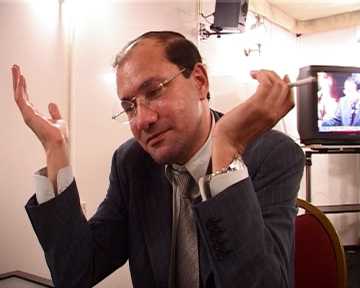

Reviews of Recent Independent, Foreign, & Documentary Films in Theaters and DVD/Home Video
Directed by: Jehane Noujaim. Produced by: Rosadel Varela & Hani Salama. Director of Photography: Jehane Noujaim & Hani Salama. Edited by: Julia Bacha, Lilah Bankier & Charlie Marquardt. Music by: Thomas DeRenzo. Released by: Lions Gate. Language: Arabic/English. Country of Origin: USA. 84 min. Not Rated. DVD Features: Commentary by Jehane Noujaim & Hani Salama. Commentary by Josh Rushing. Commentary by Al Jazeera senior producers Hassan Ibrahim and Samir Khader. Extensive deleted scenes. Arabic, English, French & Spanish subtitles. Trailer. For Westerners inundated with all-or-nothing images of flag-burning radicals or flag-waving supporters, Control Room offers a welcome respite. The acclaimed film turns a critical eye on Al Jazeera, the independent news network, which reaches 40 million Arab viewers. The film demonstrates that middle-class Arab-Muslim views on democracy and the war in Iraq are far more complicated than the Western media may have been willing to allow. At the same time, it reveals how black-and-white rhetoric on the war has apparently been rendered by the mainstream media. Among the film's protagonists is Sameer Khader, a frumpy and philosophical Al Jazeera producer, whose thoughts roll across the film like storm clouds on a summer day as he smokes his cigarettes and his mad hair falls in his face. His colleague, the burly though genial Hassan Ibrahim, is less brooding, but just as perturbed. Both are critical of the U.S.-led war, but they lavish praise on Western democratic ideals. Their insistence on journalistic balance and their visible love of debate are themselves patently democratic. Khader excoriates a producer for booking a U.S. anti-war activist whose views are "not analysis," neither balanced or objective. Yet he defends Al Jazeera's presentation of dead Iraqi women and children by insisting that he cares about Arab victims of the war. "Rumsfeld doesn't care about these people. I do," he promises. "I care." Surprisingly, Khader confesses after repeated drags on his cigarette, "Between us, if I'm offered a job at Fox News, I'll take it." He hopes his children will attend American universities "to exchange the Arab nightmare for the American dream." He smiles impishly as if he's just confessed a minor infidelity. In one quietly speculative segment, the U.S.-educated Ibrahim insists that, in years to come, the U.S. will have to find a new way to persuade its opponents: "Eventually you'll have to find a solution that doesn't involve bombing someone into submission. 'Democratize or I will shoot you.'" Yet he decides that Americans themselves will stop what he perceives as unchecked imperial power. "I have complete faith in the American people and in the Constitution." These quite candid journalists defend what is perhaps their most controversial decision from the Coalition's point of view: Al Jazeera's airing of U.S. military captives and casualties. While the Arab journalists defend themselves verbally ("Now there's a Geneva Convention? There wasn't one yesterday when the U.S. showed Iraqi prisoners"), it is in their willingness to debate honestly, and treat, as Khader says, "nothing [as] taboo" that strikes the most telling contrast with President George Bush and Defense Secretary Donald Rumsfeld. Though the documentary was filmed long before the Abu Ghraib prison scandal became public, the scandal nonetheless resonates throughout the film - especially as the film opens, with Bush's "Moment of Truth" speech: "Your fate will be determined by your actions," a somber Bush warns Iraqis. "War crimes will be prosecuted. War criminals will be punished. And it will be no defense to say, 'I was just following orders.'"Whether Al
Jazeera is the "mouthpiece of Osama bin Laden" (as Rumsfeld insists) or
engages merely in "American propaganda" (as the Iraqi foreign minister
insists) is left to the viewer. But the fact that Al Jazeera is denounced by
both sides is a promising sign. Joel Whitney, screenwriter/poet, teaches at Fordham University
DVD Extras: The deleted segments provide an inside look at Al Jazeera. Journalist Deema Khatib expresses her belief that the Arab world is
partly responsible for the war, pointing out that Arab civilians, although they should be, are not aggressive in
demanding their own democracy. However, that does not give the U.S. the right to come and fix things, she
says, making it clear that these are her individual thoughts and not a reflection of Al Jazeera.
Hassan Ibrahim strongly objects to how the U.S. is running the show. When the U.S. army announces
where journalists should stand-by in order to report from a safe position, Ibrahim is disgruntled.
Why are journalists being told where to wait? Is that not against the definition of true reporting?
On the other hand, Lt. John Rushing from Texas is disappointed that Al Jazeera shows selective scenes
and withholds information. But the biggest problem is the gap in communication between the
Arab and American media. Translators are needed elsewhere, says Rushing; if only there was
more communication and understanding between the two media groups there might be more
effective reporting.
Even in the interaction between Rushing and Ibrahim, one can see that they are not really on two extreme ends.
Much of their views share a mutual point, and they might actually be on the same plane. It is interesting, moreover, to
see how their views are rooted from different cultures. This is a must-see for all journalists and news junkies. Hazuki Aikawa, journalist, director of the documentary Yancha
|